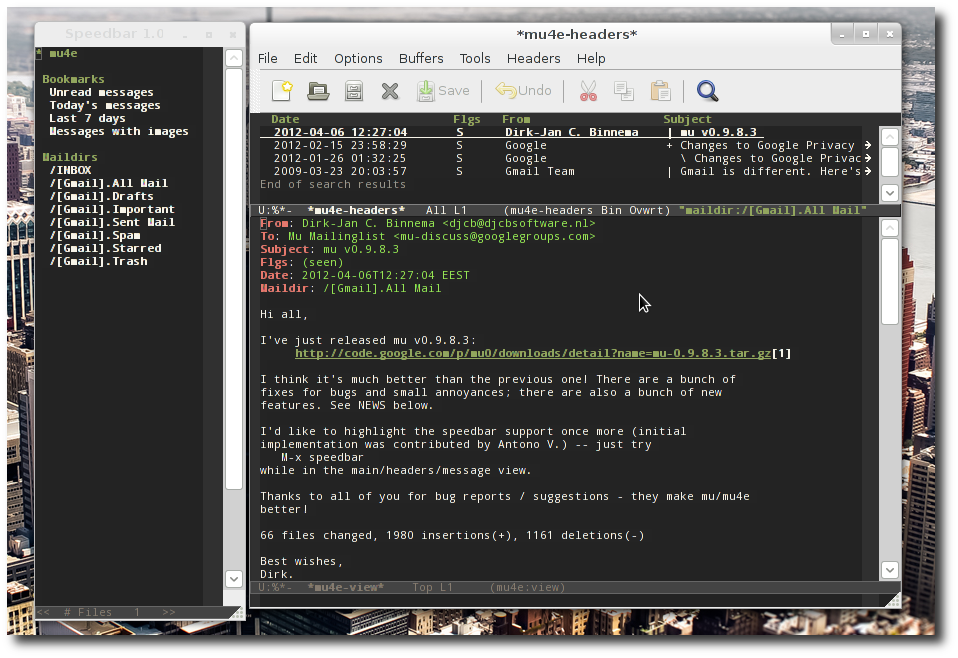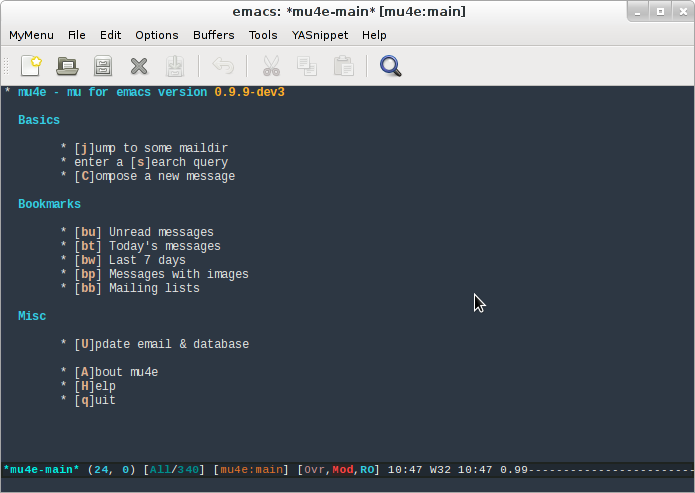Difference between revisions of "Mu4e"
(→Extensions: add conversations) |
|||
| Line 55: | Line 55: | ||
See [https://gitlab.com/ambrevar/mu4e-conversation mu4e-conversation]. It shows all | See [https://gitlab.com/ambrevar/mu4e-conversation mu4e-conversation]. It shows all | ||
| − | + | e-mails of a thread in a single view, where each correspondant has their own | |
| − | + | face. Threads can be displayed linearly (in which case e-mails are displayed | |
| − | + | in chronological order) or as an Org document where the node tree maps the | |
| − | + | thread tree. | |
== Desktop and modline notifications == | == Desktop and modline notifications == | ||
Latest revision as of 09:21, 21 June 2018
| Description | Email client |
|---|---|
| Author | Dirk-Jan C. Binnema |
| Maintainer | Dirk-Jan C. Binnema |
| Source | https://github.com/djcb/mu |
| Part of Emacs | no |
Mu4e is designed to enable super-efficient handling of e-mail; searching, reading, replying, moving, deleting. It sits on top of your Maildir (which you update with e.g. offlineimap or fetchmail).
Under the hood, mu4e is fully search-based, similar to programs like notmuch, md and sup. However, mu4e's user-interface is quite different. mu4e's mail handling (deleting, moving etc.) is inspired by Wanderlust [another emacs-based e-mail client, famously hard to get working], mutt and dired.
mu4e tries to keep all the 'state' in your maildirs, so you can easily switch between clients, synchronize over IMAP, backup with rsync and so on. If you delete the database, you won't lose any information.
Features
Features include:
- Fully search-based: there are no folders, only queries
- UI optimized for speed with quick key strokes for common actions
- Fully documented, with example configurations (like for gmail)
- Asynchronous: heavy actions never block emacs
- Write rich-text e-mails using org-mode (experimental)
- Address auto-completion based on your messages – no need for managing address books
- Extendable in many places using custom actions
For all the details, please see the (very good) manual, and see the screenshots !
The messages/header split view, with speedbar support:

Extensions
Contact completion
Complete contacts with Helm
There's a very nice and efficient solution to complete contacts in this blog post.
Complete on pressing coma (like in Gmail or Thunderbird)
For that feature, see the code snippet on http://pragmaticemacs.com/emacs/even-better-email-contact-completion-in-mu4e/
Conversations
See mu4e-conversation. It shows all e-mails of a thread in a single view, where each correspondant has their own face. Threads can be displayed linearly (in which case e-mails are displayed in chronological order) or as an Org document where the node tree maps the thread tree.
Desktop and modline notifications
Miss the "You have 2 unread messages" desktop notification ? Get it with mu4e-alert. It also displays the total of unread messages on the modline.
Push changes to your mail server automatically
Usually the user is in charge of sending updates about the changes made in his mail box to his mail server. You can actually automate this when you close mu4e using this code:
(defadvice mu4e-quit (after mu4e-close-and-push activate)
(start-process "pushmail" nil "pushmail.sh"))
Undo send and schedule email
If you queue your newly sent email for a little while before it is actually sent, you can then undo it. That's the purpose of mu4e-delay. See pragmaticemacs' blog post.
Blog roll
Some tutorials not integrated to this wiki:
- http://pragmaticemacs.com/mu4e-tutorials/ (org-mode, yasnippet,…)
